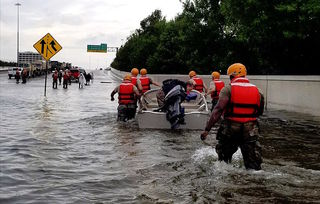Trauma
Does What Doesn’t Kill us Really Make us Stronger?
The question takes on new meaning in the aftermath of two deadly hurricanes.
Posted September 16, 2017

Over the past three weeks, the United States has grappled with two of the worst natural disasters of its history. In this country alone, the combination of Hurricanes Harvey and Irma took at least 112 lives, destroyed thousands of homes, and will lead to an estimated 450,000 people applying for FEMA assistance. The degree of human suffering is staggering.
At times like these, it’s natural to grasp for meaning. As meaning-making creatures, it’s often psychologically important for us to feel that situations make sense. That’s very hard to do in cases like Hurricanes Harvey and Irma. We may find ourselves wondering if there’s any purpose to all of this suffering, or if it’s just pointless.
One of the ways, for better or worse, that people sometimes search for meaning in the aftermath of disaster is captured in phrases like, “Every cloud has a silver lining,” “When life hands you lemons, make lemonade,” and “Look on the bright side.” But is there anything to these sayings, or are they just fruitless attempts to comfort ourselves?
Is it really true that “what doesn’t kill us makes us stronger?”
In the strictest sense, the answer to this question is “no.” Life is way more complicated than that. It’s often unhelpful and even offensive to suggest that, if a person could simply look on the bright side, everything would be okay. I’m sure that families fleeing Houston for their lives, contemplating huge property losses, and mourning lost loved ones, don’t feel that they are somehow being made “stronger.” In her book, Bright-sided, columnist Barbara Ehrenreich, reflecting on her own personal tragedy, rails against the ease with which people suggest that there is a bright side to pain. Upon being diagnosed with cancer, she searched the internet for ideas to help her cope. What she read shocked her. Although she had gotten used to the idea that she might die, she was deeply disturbed by the notion that, in her words, “I should do so while clutching a teddy bear and with a sweet little smile on my face.”
If negative events really magically made us stronger, we’d all be like superman. After all, according to data from the World Mental Health Survey Consortium, more than 70 percent of us will suffer a serious and even life-threatening trauma during our lives. To suggest that people should “look on the bright side” is to imply that such events are somehow positive. But there’s nothing positive about natural disaster, criminal victimization, being diagnosed with a serious illness, losing a loved one, being shot at in a war zone, or any of the host of other tragedies that afflict innocent lives.
On the other hand, it would ignore something fundamental about humanity—people’s surprising resiliency—to imply that the scars of trauma can never heal. One of the most debilitating of trauma’s psychological legacies is posttraumatic stress disorder, the nightmares, flashbacks, and emotional symptoms that can wreak havoc in the lives of those who have survived trauma, often for years or even decades. You may be surprised to know, however, that only around 20 percent of people who have faced traumas, even natural disasters as severe as Harvey, ever develop PTSD. That doesn’t make the condition any less serious or less deserving of high-quality treatment, of course. But it does show just how resilient people can be in the face of absolute horror.
Another astounding statistic is that up to 80 percent of survivors say that they grow in some way as a result of their tragedies. This phenomenon, officially known as post-traumatic growth can result in people redefining their relationships, deepening or altering their spirituality, or discovering a new philosophy of life. Somewhat more rarely, survivors may take their lives in new directions, return to school, change careers, move across the globe, or take steps to help others who have suffered through traumas like their own.
Recently, when I was speaking at a conference for domestic violence professionals, I asked audience members to raise their hands if a personal tragedy had influenced their decision to build a career helping others. At least three of every four hands shot into the air. After the talk, one of these audience members approached me. As she spoke, tears welled up in her eyes. “I’m not saying what I went through was good—it’s the worst thing that ever happened to me and I still struggle with it,” she said. “But I’ve managed to use my experience to help hundreds of people. It allows me to deliver the message that trauma doesn’t have to be the end.”
Whether there is truly any meaning in suffering isn’t a question that psychological science can ever really answer. Perhaps there is, perhaps not. But we do know that resilience and growth are real, even in the face of the worst suffering anyone can imagine. None of this makes the tragedy experienced on the Gulf Coast even remotely “okay.” But it may provide a little hope in the midst of what otherwise could be senseless pain.
David B. Feldman is a Professor of Counseling Psychology at Santa Clara University and co-author of Supersurvivors: The Surprising Link Between Suffering and Success. Listen to his podcast, “Psychology in 10 Minutes,” on any podcast app, through SoundCloud, iTunes, or by subscribing to the show’s RSS feed.




